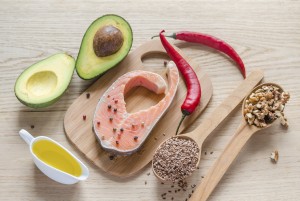Fat fights pain
Nothing makes me cringe more than when a patient tells me they’re cutting fat from their diet.
I’m fine with cutting some fats. Like the ones that hide out in cupcakes, crackers, margarine, and other processed, packaged foods. (You can spot these notorious trans-fats by looking for the terms “hydrogenated” or “partially hydrogenated” on the label. Or better yet, avoid packaged foods altogether).
But the fact is, not all fat is created equal. And some of the healthiest foods you can eat are also high in fat. Foods like nuts, avocado, and salmon. These foods are rich in a particular kind of fat, called monounsaturated fatty acids (or MUFAs).
If you’ve been following my New Hamptons Health Miracle, MUFAs probably sound familiar. They’re really one of the cornerstones of the entire program because they offer some truly tremendous health benefits.
And a new study underscored the benefits of another type of fat I wholeheartedly endorse—omega-3 fatty acids.
One simple step to slowing arthritis
Granted this study was done in mice, and animal studies don’t hold the same weight as human trials. But I think it’s still worth mentioning, considering the points raised by the researchers underscore the messages I’ve been sending for years.
Take a look at some of the study details and you’ll see what I mean.
Mice with knee injuries were given one of three high-fat diets: one rich in saturated fat, one rich in omega-6 fatty acids, and one rich in omega-6 fatty acids AND omega-3 fatty acids.
Researchers found the mice consuming the omega-3 fatty acids had healthier joints than the other mice.
“While omega-3 fatty acids aren’t reversing the injury, they appear to slow the progression of arthritis,” said the study’s lead author. “In fact, omega-3 fatty acids eliminated the detrimental effects of obesity in obese mice.”
Now, I’m not telling you to be obese. Quite the opposite, in fact. But if something as simple as omega-3s can help you combat arthritis pain while you’re on the path to a slimmer, healthier you—well, then I’m all for it.
Plus, the research team also came to the same conclusion I’ve been hammering home to my patients and readers for decades: The key to combating arthritis—or any other chronic condition, for that matter—is to start with your diet.
What you eat matters. And choosing the right foods—and the right fats—makes a huge difference in your outcome. This study shows you can slow down the progression of arthritis simply by adding healthy fats to your diet. It doesn’t get much easier than that.
But that wasn’t the only benefit the researchers found.
You are what you eat
The researchers also found that mice who got omega-3 fatty acids also healed much more quickly than the other groups—regardless of overall body weight.
The researchers are working to translate their findings to humans. But for now you have all you need to know. There’s no reason to banish fat from your diet. In fact, if you’re suffering from arthritis, it’s actually one of the best pain-fighting tools in your toolbox. Provided you choose the right kinds, of course.
Include lots of MUFA-rich foods in your diet. Avocados, salmon, and my personal favorite—macadamia nut oil—should all be staples in your kitchen. And, of course, I recommend taking a fish oil supplement (3,000 mg of combined EPA and DHA) each and every day.
Here’s a great, easy recipe to add to your menu this week that will help you get more MUFAs and omega-3s. Your joints—and your taste buds—will thank you.
Succulent sautéed salmon with arugula and avocado
Ingredients
4 (5- to 6-ounce) wild-caught salmon filets
1/3 cup macadamia nut oil
4 cups baby arugula
1 lemon
1 avocado, pitted and cut into cubes
Salt and pepper
Directions
In a large mixing bowl, combine arugula and avocado. Cut lemon in half and squeeze juice from each half onto arugula/avocado mixture. Divide salad onto four serving plates. Top each salad with a drizzle of macadamia nut oil.
Heat remaining oil in large skillet over medium-high heat. Season salmon fillets on both sides with salt and pepper. Add fillets to pan, skin side down. Reduce heat to medium-low. Cook fillets until skin is crisp and lifts easily from pan (about 5-6 minutes). Flip fillets and continue cooking for another 3-4 minutes, or until slightly firm to the touch.
Remove fillets from pan and place on top of salads. Serve immediately.
SOURCE:
“Dietary fatty acid content regulates wound repair and the pathogenesis of osteoarthritis following joint injury,” Ann Rheum Dis, epub ahead of print 7/10/14
*******
Dr. Fred Pescatore is the author of the New York Times best-selling book, The Hamptons Diet and the No. 1 best-selling children’s health book, Feed Your Kids Well, amongst others. He is the President of the International and American Associations of Clinical Nutritionists, a member of the American College for the Advancement of Medicine, and belongs to many other professional organizations. Earlier in his career, Dr. Pescatore served as the Associate Medical Director of The Atkins Center for Complementary Medicine, working as the right-hand-man to the late, great Dr. Robert C. Atkins. Today he sees patients at his own practice in Manhattan and writes a monthly newsletter called Logical Health Alternatives, as well as a free e-letter called The Reality Health Check.
